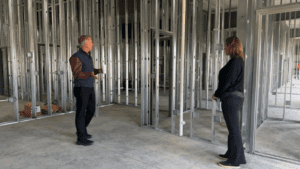By Pat Melgares, K-State Research and Extension news service
MANHATTAN, Kan. – Turns out, time spent outside is good not only for children’s ability to be physically active. Kansas State University child development specialist Bradford Wiles says it’s pretty valuable for their minds, as well.
“There are so many benefits for adults and children to be together,” Wiles said. “Not only do we respond better mentally and physically to fresh air, but being outside typically involves some movement. It’s a great opportunity for parents and their children to learn with and from each other.”
“Mentally,” he adds, “there are just so many cool things happening. Trees are growing, plants are no longer dormant, there are insects everywhere and other parts of the natural environment are starting to emerge. Getting outside is a really good opportunity to spend time with your family just having a good time.”
Weather is rarely predictable, but spring should provide warmer weather that is conducive to outdoor activities, Wiles said, noting that parents don’t need to plan structured activities.
“I think some of the best advice I can give to anyone is that there’s nothing wrong with saying, ‘hey, let go outside and let whatever happens, happen,’” Wiles said.
Unplanned activity “gives your children an opportunity to do some self determination,” he said. “They are continually being told what to do and how to do it, so going outside opens up the possibilities for them to engage in self-directed play. Let them choose what they’re going to do. That’s really empowering for them.”
Wiles describes play as “the work of early childhood.”
“For children, they’re completely learning about their world through play. They are learning cause and effect – they are beginning to understand what happens if I do ‘this.’ That’s part of growing up and so the opportunity to engage in self determination builds their self esteem.”
Wiles said children develop self-efficacy – an individual’s belief in their ability to making things happen – by exploring their world. He notes it can be simple things, such as throwing rocks or drawing in the mud.
“All of those things feed into a mental health component of child development,” Wiles said. “There’s always value in getting some energy out; that’s a shorter term effect. But the longer term is very much about increasing self efficacy and making sense of what they can and can’t do.”
“That’s an important part of growing up. What we know is that children who get experiences in managing frustration from an early age, and learn the skills that go with that, end up being much healthier mentally going forward.”
The same skills can be learned during indoor play, but getting outside as the temperatures get warmer provides a larger world to explore.
“One of the things I love about being outside is that it’s almost it’s own reward,” Wiles said. “We all generally feel a little bit better. Yes, the sun will take your energy out of you…but at the end of the day, it’s just great. Being outside and playing with your kids or letting them play on their own or with peers…What’s not to love?”
More information on child development is available online from K-State Research and Extension.













